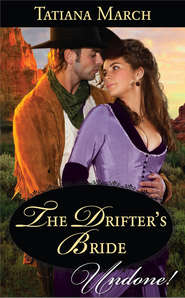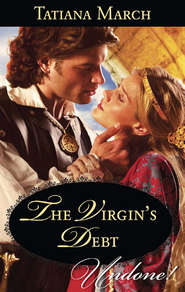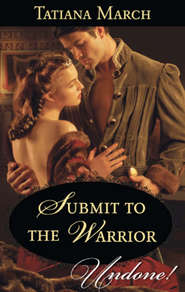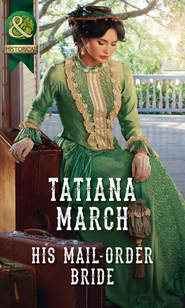По всем вопросам обращайтесь на: info@litportal.ru
(©) 2003-2024.
✖
The Bride Lottery
Настройки чтения
Размер шрифта
Высота строк
Поля
Miranda opened her right fist. Empty. The left fist. Empty. She tugged at the nearest blond pigtail, shook the pebble out of it. The little girls jumped up and down, screaming in delight.
Mrs. Summerton broke into a smile of relief. “Thank you. If there ever was an angel sent from heaven, you must be it.” She pointed at the little girls. “Two sets of twins. Can you believe it?” She rubbed her belly. “This one will be a boy. My husband is convinced.”
While they waited for help to arrive, Miranda kept the four little girls occupied, allowing their mother a moment of peace. Soon a young freckle-faced footman brought a crowd from the public house down the road and they hoisted up the carriage for the coachman to secure the wheel.
“Would you like to ride to Boston with us?” Mrs. Summerton asked.
It would save time and keep her out of sight. And she could hear the plea in the woman’s voice. Miranda accepted the offer. By the time they reached the city, Miranda had adjusted her ideas about the joys of motherhood. She alighted at the railroad station, with another four dollars in her pocket and an offer of a position as a governess if she ever needed one. The mere thought made Miranda shudder. She hurried away, the voices of the four little hoydens ringing in her ears.
Chapter Two (#u6263ff93-6fa5-55f7-bcef-2e846db924ff)
The money Miranda had earned entertaining the boisterous Summerton children allowed her to buy a ticket on the train to New York City, which avoided having to sell Mama’s brooch in Boston where someone might have recognized her.
On the train, she kept her face averted, her bonnet pulled low. An express service covered the journey in six hours, but to save money Miranda took a slow train that made frequent stops. By the time they arrived in New York City, darkness had fallen.
Once the passengers had dispersed in their carriages and hansom cabs, only creatures of the night remained—gaudily dressed women past their prime, accosted by men willing to benefit from their favors. The evening cool did little to clear the sultry air thick with coal smoke.
Appalled at the squalor, Miranda found a hidden corner behind an empty newspaper stand and huddled there for the night. All thoughts of finding a jeweler to sell Mama’s brooch vanished. She hated the city and could not wait to leave. In the morning, as the station grew busy again, she snuck on board the first westbound train.
Traveling without a ticket proved easier than Miranda had expected. Days turned into nights and nights into days. The train made frequent stops, in small towns and at water towers, and she used them to move from car to car, to minimize the chances of getting caught.
Twice, she charmed a conductor into believing she’d misplaced her ticket. Another conductor proved immune to feminine allure, and Miranda burst into tears, pretending to be too distraught by the loss of her husband to produce her documents.
Despite her success in evading exposure, an uneasy feeling prickled at the back of her neck. A sensation of being watched. Miranda told herself it was only natural. She had become a lawbreaker, and the guilty conscience put her nerves on edge.
Through the window, fields and meadows gave way to run-down tenements and warehouses. The glass-paneled door at the end of the car swung open. The conductor—the small, potbellied man who had been immune to her charms—strutted up the aisle.
“Chicago!” he yelled. “Next stop Chicago. Everyone change. Southern Pacific Railroad to St. Louis and all towns south. Union Pacific Railroad to all towns west.”
Miranda gathered up her sailcloth bag. To economize, she’d avoided the dining car, instead taking the opportunity to buy bread and cheese and stuffed pies from platform vendors. Even then, she had less than a dollar left.
She followed the stream of passengers down the metal steps. The platform teemed with life. Between a farmer with a pushcart full of potatoes and a donkey with two heaped panniers, Miranda glimpsed a man—and felt a blow in her gut.
Her frantic eyes took in the fawn trousers, the peacock blue coat. The tall hat, the silver-topped walking stick. Light brown hair and long sideburns. Pale skin and the sullen features of a man who drank too much, gambled too much and seemed to harbor a bitter grudge against life.
It couldn’t be. But it was. Cousin Gareth.
He must be following her. And whatever she did, she must not lead him to Charlotte. Miranda spun around and set off running in the opposite direction. She knocked into the pushcart, sent a flurry of potatoes rolling over the platform. The farmer burst into an angry bellow. Passengers tripped over the spill, crying out complaints. Miranda dipped and darted through the throng, bumping into people as she hurtled along.
A train was pulling away. With an extra spurt of speed, Miranda raced after it, her boot heels clicking a frantic beat against the concrete platform. The whistle blew. A cloud of steam billowed from the engine. The train left the station but Miranda kept up her chase, leaping down to the tracks. Her canvas pouch fell off her shoulder. Not pausing to pick it up, she forced her legs to move faster.
Lungs bursting, arms pumping at her sides, skirts flapping around her feet, she hurtled along. She was gaining on the train, the gap shrinking. Five yards. Four. Three. Another merry whistle, and the train clattered onto another set of rails, slowing down for an instant while the wheels negotiated the junction.
With a desperate burst of effort, Miranda threw herself forward and grabbed the handrail around the small platform at the end of the last car. Her feet lost contact with the ground. Grimly, she hung on, the toes of her button-up boots bouncing against the timber sleepers, her fingers locked in a death grip around the iron handrail.
The train increased its speed. Pain tore at Miranda’s arms. Inch by inch, she dragged herself upward, her body like a coiled spring, her muscles vibrating with the effort. A violent shaking seized her. She almost lost her grip but managed to swing one foot up on the iron steps. Another foot. With a final jerk of her arms and shoulders, Miranda flung herself onto the platform and collapsed there, panting for breath, exhaustion and relief coursing through her.
When finally her senses sprang back to life, Miranda looked up. She could see the Chicago skyline disappearing off into the distance. Beneath her, the train rocked with a steady motion. The sun baked down on her black clothing, adding to the perspiration that coated her skin. She reached up one hand, found her bonnet dangling by its ribbons.
Slowly, she scrambled to her feet, her fingers clutching the handrail. She tried the handle on the door at the end of the car. Unlocked. Miranda went through. It was the mail car, with boxes and parcels stacked on both sides of the narrow passageway. A thin man in a white shirt with sleeve garters was sorting letters into slots on a wooden rack.
He stared at her. “Where did you come from?”
Miranda gave him a shaky smile. “I almost missed the train.”
He puffed out his narrow chest with an air of authority common to petty bureaucrats all over the world. “You can’t stay here,” he said. “This car is for authorized personnel only.”
Miranda sank onto a wooden crate. She could see the man wanted to tell her sitting on mail items was against the rules. She peered up at him from between her lashes. “May I rest here for a moment?” she pleaded. “I promise to move into another car at the first stop.”
The man bristled but appeared mollified. He resumed sorting letters into the wooden pigeonholes mounted on the wall. “How far are you going?” he asked. “Are you going all the way to San Francisco?”
“No. I’m going to the Arizona Territory.”
The man grinned with the smug satisfaction of someone who possesses superior knowledge and intends to gloat with it. “In that case, you’re on the wrong train,” he replied with thinly disguised glee. “This is a Union Pacific Railroad express service to San Francisco and all towns west.”
* * *
Miranda had never known hunger could cause such pain, as if tiny teeth were gnawing at her insides. She had lost the last of her money with her bag, and for three days she had eaten nothing but leftovers from meal trays waiting for collection outside the compartments in the first-class Pullman car.
At least she was safe from Cousin Gareth, for it would be impossible for him to catch up the express service. If she continued to San Francisco, she could take a southbound train to the Arizona Territory. The roundabout journey added to the distance, but she would eventually get to Gold Crossing—if she didn’t die of starvation first.
Already, the train had chugged through Iowa and Nebraska, where the endless prairie landscape could almost make one believe the world might be flat after all. So far, Miranda had been successful in dodging conductors, but the most recent one—a big, rawboned man with a bushy moustache—had his eye on her, she could tell.
At the next stop, Miranda switched to a second-class car and spent a moment inside the convenience, unstitching the ruby-and-diamond brooch sewn into her petticoats. Then she walked up and down the aisle, assessing the female passengers.
She chose a buxom woman who sat by herself, dressed in tight corsets and a gaudy purple gown. No respectable woman would buy anything from a stranger on a train, but this female possessed the right mix of expensive clothing and a common touch.
Miranda slipped into the empty seat on the padded bench beside her quarry. She clamped down on her scruples and opened her fist to display the lure of the jewel. “Excuse me for approaching you so boldly, but I am in urgent need of funds. I have a family heirloom I wish to sell. I thought perhaps you might be interested.” She gestured at the woman’s purple gown. “The rubies would match your dress.”
The woman peered down at the brooch, then returned her attention to Miranda. There was no mistaking the greed that flashed in her eyes. “What’s your name, darling?” The words came in a coarse accent, the voice raspy with whiskey and tobacco. The heavy scent of perfume failed to mask the stale, unwashed smell.
“I am Miss Fai—Mrs. Woods.”
Plump fingers fumbled at Miranda’s palm as the woman picked up the brooch. She inspected the jewel carefully. “It is real gold,” Miranda hurried to reassure her. “And the stones are genuine diamonds and rubies.”
“It says Fairfax here. I thought you said your name’s Woods.” The woman pointed at the engraving. To my darling wife. H. Fairfax.
Miranda swallowed. She was leaving a trail, but it could not be helped. “The brooch belonged to my mother,” she explained. “Woods is my married name.”
“I see.” The woman spent another moment examining the brooch. Then, as if losing interest, she dropped the jewel back in Miranda’s palm. “No, thank you.” She made a flapping motion with her hand, ushering the intrusion away.
Baffled, Miranda rose to her feet. She could see the shine of covetousness in the woman’s eyes, could see all her chins wobble with the eagerness to possess, and yet the matron had not even asked for the price.
“Thirty dollars,” Miranda said. “It’s worth three times as much.”
Ignoring her, the woman turned to look out the window. Miranda walked away, blinking back tears of defeat. She settled on an empty bench and rested her head against the wall, in the hope that sleep might offer a moment of respite from the gnawing hunger.
It seemed only seconds later the conductor was shaking her awake. It was the big, rawboned man with a bushy moustache, and he was scowling down at her. Behind him, the woman in a purple gown was standing in the aisle, gripping the seatbacks for support, her ample frame wobbling with the motion of the train.











